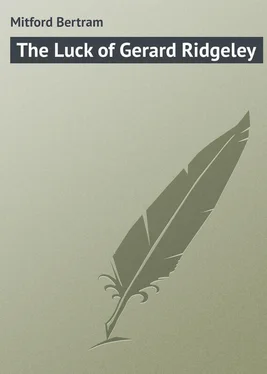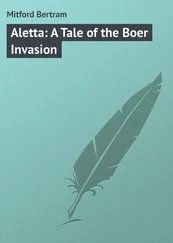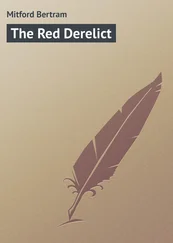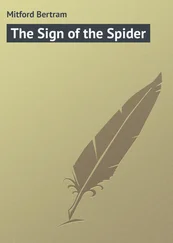Bertram Mitford - The Luck of Gerard Ridgeley
Здесь есть возможность читать онлайн «Bertram Mitford - The Luck of Gerard Ridgeley» — ознакомительный отрывок электронной книги совершенно бесплатно, а после прочтения отрывка купить полную версию. В некоторых случаях можно слушать аудио, скачать через торрент в формате fb2 и присутствует краткое содержание. Жанр: foreign_prose, на английском языке. Описание произведения, (предисловие) а так же отзывы посетителей доступны на портале библиотеки ЛибКат.
- Название:The Luck of Gerard Ridgeley
- Автор:
- Жанр:
- Год:неизвестен
- ISBN:нет данных
- Рейтинг книги:5 / 5. Голосов: 1
-
Избранное:Добавить в избранное
- Отзывы:
-
Ваша оценка:
- 100
- 1
- 2
- 3
- 4
- 5
The Luck of Gerard Ridgeley: краткое содержание, описание и аннотация
Предлагаем к чтению аннотацию, описание, краткое содержание или предисловие (зависит от того, что написал сам автор книги «The Luck of Gerard Ridgeley»). Если вы не нашли необходимую информацию о книге — напишите в комментариях, мы постараемся отыскать её.
The Luck of Gerard Ridgeley — читать онлайн ознакомительный отрывок
Ниже представлен текст книги, разбитый по страницам. Система сохранения места последней прочитанной страницы, позволяет с удобством читать онлайн бесплатно книгу «The Luck of Gerard Ridgeley», без необходимости каждый раз заново искать на чём Вы остановились. Поставьте закладку, и сможете в любой момент перейти на страницу, на которой закончили чтение.
Интервал:
Закладка:
“Possibly there are,” said Gerard. “But before you attempt anything foolish, just hear what I’ve got to say. My name’s Ridgeley, and – ”
“Eh? What!” The other was staring at him open-mouthed now. “What did you say your name was?”
“Ridgeley – Gerard Ridgeley,” was the reply, in some astonishment at the sadden transition in the other’s demeanour.
“Why on earth didn’t you say so before?”
“Well, I tried to, but you wouldn’t let me get in a word edgeways. Isn’t there a Mr Anstey living somewhere about here? Umjilo is the name of his place, I believe.”
“Quite right, Gerard, quite right. There is. I’m Mr Anstey, and yonder’s Umjilo” – pointing to the house before referred to. “And so you’re young Ridgeley! Well, well!”
Gerard started and stared, then stared again. His countenance exhibited surprise, relief, amazement, but no satisfaction; relief at this fortunate termination of their difference, yet a profound sense of disappointment. That this seedy, disreputable-looking rowdy should turn out to be the relative of whom he was in search was something of a shock, and that such a specimen as this should have it in its power to advance his prospects in life seemed incredible. His hopes sank to zero.
“Lord, now, to think of that!” went on Anstey. “And to think how near we came to punching each other’s heads! You’d never have dreamt it, eh, Gerard? I’m a bit of a rough chap, I’m afraid. Years of this cursed country and climate are apt to touch up a man’s temper and liver; but I mean no harm – bless you, no. We haven’t shaken hands yet.”
Gerard reddened, as he came to himself, and held out his hand eagerly. Young as he was, his natural acumen had detected a false ring underlying the assumed heartiness of the other’s speech, and he feared by his manner to show it.
“Now, introduce your friend. Ah, very sorry, sir, we should have had any difference of opinion. Shake hands and forget all about it. I’ll soon have your horse brought back. And now, come round to the house and have some dinner. It’s a bit rough, maybe, but very much at your service.”
The almost deferential tone of this apology completely availed to salve Harry Maitland’s wounded dignity, and he began to see in his whilom foe, but now prospective host, an uncommonly sensible fellow, shrewd enough to appreciate to a hair his own sense of self-importance. The natives, with many surprised ejaculations over this unlooked-for turn events had taken, dispersed by twos and threes, not, however, before Anstey had despatched a couple of them to hunt up the runaway steed.
“Come on up to the house,” he went on. “I dare say you’ve learnt not to expect much by this time – not much in the way of comfort, that is. When did you land?”
“Only a few days ago,” answered Gerard. “We came straight on here at once. Travelled up to Maritzburg in a waggon, chartered a horse apiece, and came out to find you.”
“Travelled up in a waggon, did you say? Whose waggon?”
“John Dawes’s. A rattling good chap. Do you know him?”
“Used to. But, between you and me, Gerard, he’s not really much of a chap. Did he – er – seem to know me?”
The covert anxiety of the tone brought back to Gerard’s mind the queer expression which the mention of his relative had called up to the transport-rider’s face. Still it was possible that the two men had but quarrelled. At the same time, do what he would he could not quite overcome a growing aversion to Anstey. This was hardly promising for their future relationship.
“This is my crib,” said Anstey, as they approached the house. “The store’s at the back. We’ll go round and look at it presently. Come in; come in.”
The house was a rough, square, one-storeyed building, roofed over with corrugated iron. A low stoep ran round the front of it, and the door opened into the sitting-room direct, without the intervention of any entrance hall. The floor was of hard clay covered with matting, and the furniture of the very plainest. Accommodation seemed strictly limited, for besides the room which did duty as the proprietor’s bedroom there was only one other, and it was half full of lumber of every description. The whole of the back part of the house was used for the trading store, and from this came a foetid and pungent whiff, mingled with the deep bass hum of native voices.
While they dined – on a baked shoulder of mutton, with pumpkin and sweet potatoes – Anstey questioned his young guests somewhat profusely as to their plans and prospects. Gerard, whose rising aversion had engendered in him suspicions of which he was more than half ashamed, fancied he detected a slight change of manner on his host’s part, as he frankly avowed his own utter lack of prospects or means, and a corresponding increase of cordiality towards Harry Maitland, who was not prone to underrate himself or his possessions.
“I remember your mother perfectly well, Gerard,” said Anstey. “But I never saw your father. So they shipped you off to shift for yourself, eh? Well, we must see what can be done for you. And what are your plans, Maitland?”
“Oh, I must first go round and look up a lot of people I’ve got introductions to,” was the airy reply. “Nothing like looking around a bit before making up one’s mind, eh?”
“Quite right, quite right,” nodded their host approvingly, inking another glass of grog, which, by the way, was the sixth he had taken since he came in. Then he proposed they should light their pipes and stroll round and look in at the store.
The latter was a long low room, with a counter running through it. This, as also the shelves lining the walls, was covered with goods – blankets and rugs, canisters of coffee and sugar, brass wire and bangles and every species of native “track,” biscuit and paraffin tins. Strings of beads of every conceivable hue, overcoats, and flannel shirts, and moleskin trousers hung from pegs, and clusters of reims , or raw-hide thongs – for rope is but little used in South Africa – in fact, half a hundred varieties of the genus “notion” for supplying the needs of customers, native or white.
The room was pretty full of tobacco smoke and natives, who suspended their conversation and nudged each other as they recognised the two young strangers against whom their aid had been invoked for hostile purposes, but who were now hand in glove with the proprietor behind the counter. A lanky youth in shirt-sleeves, with a mud-coloured, wispy face, was presiding over the transactions.
“Well, Smith, how’s ‘biz’?” said Anstey. The wispy youth shrugged his shoulders and growled some inarticulate reply in monosyllable. Then, on being introduced to the new-comers, he extended a limp paw to each, and returned to his former occupation of measuring out roll tobacco to a native, always with the same wooden and vacant expression.
“Well, how do you think you’d like storekeeping?” said Anstey, as he went through the performance which he jocosely termed “showing them round the place,” though, apart from a tumble-down stable and the historic mealie-field before described, there was no “place” to show them round.
Gerard, the recollection fresh in his mind of the dismal room and foetid atmosphere, and the generally depressing aspect of all connected therewith, replied, with an inward shudder, that he hardly thought he would care about it. He would much prefer farming. This was greeted as a huge joke.
“Pooh!” said Anstey. “Farming is a beggar’s trade compared with this. Why, bless my soul, a farmer’s a slave to all the seasons, to every shower of rain, or the want of it, even if his place and stock ain’t mortgaged up to the hilt. Again, the diseases among cattle are legion. Now, in a neat little store like this of mine, you can just coin money hand over fist.”
Читать дальшеИнтервал:
Закладка:
Похожие книги на «The Luck of Gerard Ridgeley»
Представляем Вашему вниманию похожие книги на «The Luck of Gerard Ridgeley» списком для выбора. Мы отобрали схожую по названию и смыслу литературу в надежде предоставить читателям больше вариантов отыскать новые, интересные, ещё непрочитанные произведения.
Обсуждение, отзывы о книге «The Luck of Gerard Ridgeley» и просто собственные мнения читателей. Оставьте ваши комментарии, напишите, что Вы думаете о произведении, его смысле или главных героях. Укажите что конкретно понравилось, а что нет, и почему Вы так считаете.












